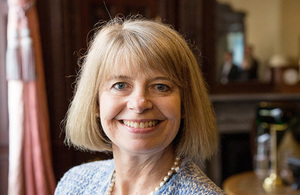Minister Harriett Baldwin visits Ukraine
Joint Minister of State for the Foreign and Commonwealth Office and the Department for International Development Harriett Baldwin will visit Ukraine

Baldwin
During a visit to Ukraine, Minister Baldwin will meet representatives from government and civil society and see first-hand the positive impact that the UK is having on the humanitarian situation and Anti-Corruption efforts in the country.
While in Ukraine Minister Baldwin will announce that the UK is increasing funding this year by £2.8m for humanitarian support to the country as well as £3.5m for further peacebuilding activities, including supporting conflict-affected populations and helping to address gender-based violence.
The UK’s support has already helped to create mine action legislation and standards in Ukraine. And with UK assistance, the HALO Trust has made over 2.5 million square metres of land safe from explosive remnants of warfare, saving lives.
Minister Harriett Baldwin said:
I am delighted to be visiting Ukraine to discuss a range of humanitarian and political issues with government and civil society representatives. I look forward to attending a demining demonstration by the HALO Trust, who carry out vital work in keeping people safe from landmines and other explosive hazardous threats. I will also meet social support teams who work with survivors of gender based violence and internally displaced people. Their work is often harrowing but critical in supporting families who have suffered the consequences of conflict.
Ukraine also continues to face significant challenges in delivering the reforms that are needed to improve ordinary Ukrainians’ lives. Ukraine must stay the course to deliver its vital reform agenda and fight attempts to derail it. Many of the right steps have been made, however there is still much work to do. That is why the UK government remains committed to helping Ukraine combat corruption, including through support to the National Anti-Corruption Bureau and funding to the Transparency and Accountability of Public Administration and Services (TAPAS) project.
The UK is a major donor to Ukraine and provides over £35 million of support, which includes assistance to combat corruption and carry out economic and governance reforms. The UK also provides vital humanitarian support to communities affected by the conflict and is the top donor to the International Committee of the Red Cross. The UK is also one of the leading donors in Ukraine supporting survivors of gender-based violence, a problem often exacerbated by conflict. UK aid in this area includes funding shelters, an emergency national hotline and psychosocial, legal and medical assistance to survivors.
Notes to Editors:
-
A full list of the UK funded projects in Ukraine in the financial year 2018/2019 can be found here: ENGLISH and UKRAINIAN
-
With UK funding, 212 Mine Risk Education Sessions (MRE) were delivered to target communities in this financial year alone. These sessions reached a total of 9,565 beneficiaries: 2,575 boys, 2,326 girls, 2,256 men and 2,408 women.
-
Since the outset of UK support in 2015, 88,747 survivors of gender based violence have accessed shelters, received support from psychosocial mobile support team or received advice from our hotline.
-
More than 27 gender-focussed caucuses have now been established in local councils across Ukraine, as part of a UK Good Governance Fund project on women’s political participation with NDI. Gender-focussed caucuses support increased involvement of women in politics, and a gender-sensitive approach to policy-making and budgeting.
-
The £3.5m funding uplift comes from the Conflict, Stability and Security Fund, which supports security, defence, peacekeeping, peace-building and stability activity across the world. This funding is in addition to the £14m the CSSF already provides in Ukraine.
-
The £2.8m funding uplift comes from DFID’s Humanitarian contribution.